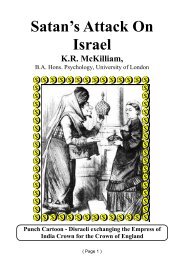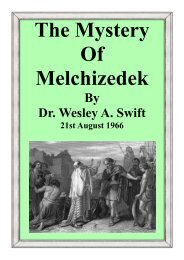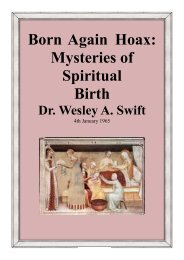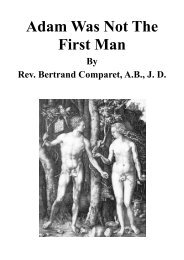Curse of Cannan - The New Ensign
Curse of Cannan - The New Ensign
Curse of Cannan - The New Ensign
Create successful ePaper yourself
Turn your PDF publications into a flip-book with our unique Google optimized e-Paper software.
to Uranus and his three sons, an obvious reference to Noah. Ham later became known as the<br />
Egyptian God Amon.<br />
Herodotus writes that the first king <strong>of</strong><br />
Egypt, who reigned until 2320 B.C.<br />
Eusebious says that three hundred<br />
successive sovereigns descended from<br />
him, the Thinite Kings, who had<br />
succeeded the demigods. <strong>The</strong> historian<br />
Murtado referred to Shem as Menes.<br />
As the most able son <strong>of</strong> Noah, Shem<br />
exemplifies the qualities upon which<br />
all subsequent civilizations have been<br />
built; courage, the desire to build, and<br />
the willingness to subdue those who<br />
have adopted a lower form <strong>of</strong> life. He<br />
is the Adamite who created<br />
civilizations as we have known it. On<br />
the other hand, the descendants <strong>of</strong><br />
Ham, the Canaanites, exemplify the<br />
Satanic urge to destroy civilization and<br />
the rebellion against God. J. Hewlitt<br />
points out that Adamite meant a<br />
"thinker," and mena or man produced<br />
Menes, the thinking man. This survives<br />
today in the intellectual society, Mensa.<br />
<strong>The</strong> distinction was made to distinguish the lineage <strong>of</strong> Adam from the pre-Adamites, or<br />
non-thinking men. (Ruling Races <strong>of</strong> Prehistoric Man, v. 2 p. 364). <strong>The</strong> Jewish Encyclopaedia<br />
says that Shem became king <strong>of</strong> Jerusalem as the representative <strong>of</strong> YHWH, so that he could<br />
carryon the battle against the slave people, the Canaanites.<br />
In Genesis, we find this verse: "Bless be the Lord, the God <strong>of</strong> Shem!" Genesis 9:26. Shem had<br />
five sons: Elam, from whom came the Persian Empire; Asshur, from whom came the Assyrian<br />
Empire; Arpachshad, Lud, and Aram. So great was the reverence for the name <strong>of</strong> Shem in the<br />
ancient world that his name in many records became synonyous with YHWH. Yahweh, or, in a<br />
later version, Jehovah, derives directly from the Hebrew verb Hava (h), meaning, "I am."<br />
Historically, this was read as the older Khufu, or HWFW, instead <strong>of</strong> YHWH, and thus it refers<br />
to Kufu, or Shem, the builder <strong>of</strong> the Great Pyramid. It was because or the persecutions <strong>of</strong> the<br />
fair-skinned peoples by the priests that Khufu, which phonetically is almost identical with the<br />
Hebrew Hava (h), became YHWH, the God <strong>of</strong> the Exodus from Egypt. <strong>The</strong> Encyclopaedia<br />
Britannica notes <strong>of</strong> "Jehovah," "<strong>The</strong> pronunciation '1' is an error resulting among Christians<br />
combining the consonants YHWH with the vowels <strong>of</strong> 'adhonay' Lord, (Adonis) which was<br />
substituted by the Jews for the sacred name YHWH, commonly called the tetragrammaton, or<br />
four consonants. <strong>The</strong> name 'Jehovah' first appears in the manuscript <strong>of</strong> Martin's Pogio in the<br />
fourteenth century." Thus the name <strong>of</strong> Jehovah, which is commonly used in our churches, is only<br />
five hundred years old!<br />
In order to understand why the name <strong>of</strong> Shem was systematically reviled and concealed<br />
throughout the records <strong>of</strong> history, we must return to the record <strong>of</strong> his thoroughly degenerate and<br />
evil nephew, Canaan. Canaan was so wicked that his last will and testament to his children was<br />
a formula for vice. It read, "Love one another (that is, <strong>of</strong> this tribe only), love robbery, love<br />
lewdness, hate your masters, and do not speak the truth." This remarkable document, the Will<br />
<strong>of</strong> Canaan, is to be found in only one place in all the world's theological literature, the Babylonian<br />
Talmud, where it is presented thusly, "Five things did Canaan charge his sons: love one another,<br />
love robbery, love lewdness, hate your masters, and do not speak the truth." Pes. 113b.<br />
( Page 11)
















